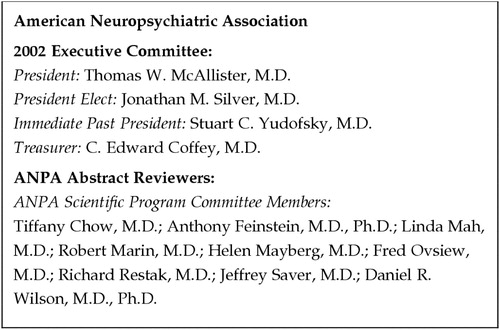Thirteenth Annual Meeting, AMERICAN NEUROPSYCHIATRIC ASSOCIATION
Scientific Program
The 13th Annual Meeting of the American Neuropsychiatric Association will take place in La Jolla, California, from March 9 through March 12, 2002. Those of us involved in planning and organizing the program are looking forward to it and hope to see you there.
On Saturday and Sunday, March 9 and 10, two sessions in the pre-meeting Continuing Medical Education workshops address aspects of dementia, including the understanding and treatment of Alzheimer disease and frontotemporal dementia, the infectious and transmissible dementias, and the recognition and management of mild cognitive impairment.
The program proper begins on Sunday evening with a keynote address by Dr. Robert Sapolsky. In his interest in the neuroendocrinology of stress, Dr. Sapolsky mixes primatology and neurobiology into an entertaining and illuminating brew. The Presidential Symposium on Monday morning, organized by Dr. Thomas McAllister, takes up the issue of awareness of deficit in neuropsychiatric disorders. The speakers address psychosis, body dysmorphic disorder, and obsessive-compulsive disorder. Every clinician knows of the impact abnormal awareness of illness has on management, and the symposium should contribute to our greater understanding of the neurobiology of this common feature of neuropsychiatric illness.
On Monday afternoon and Tuesday morning, we continue our recent practice of taking up a major issue in neuropsychiatry in a two-part symposium. This year, in order to have even more time available for interaction among the panelists and between the panel and the audience, the number of speakers has been reduced. Our chair for this panel, Dr. Thomas Insel, is a leader in the neuroscientific understanding of social behavior, and he has arranged a discussion that focuses on the cutting edge of the topic. Speakers address the current understanding of the neurobiology of attachment and social interaction and imaging-based efforts to expand that understanding.
On Tuesday afternoon, Dr. Richard Restak assumes his familiar role as moderator of a panel on a contemporary controversy in neuropsychiatry. This year we consider the issue of adult Attention Deficit Disorder. Again, ample time is scheduled for dispute among the panelists and questions and comments from the audience.
As always, two poster sessions, on Sunday and Tuesday in the late afternoon, provide those attending the meeting another window into the exciting research pursued around the world in our field. The Program Committee has been privileged to review the submitted abstracts, and their quality is high.
The 2002 venue is a new location for our meeting. We hope to see old friends as well as new attendees whose presence at our meeting is facilitated by a West Coast location. The meeting is generously supported by a number of contributors, whose company names are listed in the brochure. As in previous years, the heavy lifting in organizing the meeting is done not by the Committee but by Mrs. Sandra Bornstein, our administrator, without whose efforts the meeting would have been impossible.
FredOvsiew, M. D., Chair, ANPA Scientific Program Committee
 |



